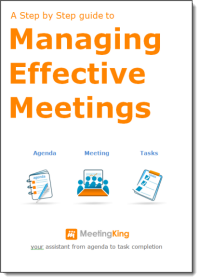What is a general management meeting?
General management meetings are probably the most common meetings in many organizations. Whether you run a department, an entire company, a school or a church, you will have meetings with representatives or leaders of all departments together. While these meetings are common, they are also the most challenging meetings to organize.
Challenges with organizing a general management meeting.
As we all know and as explained in previous articles, a good meeting starts with an agenda. Having a meeting without an agenda, is like doing an exam without studying; you will fail.
The challenge with a general meeting is that you will discuss various topics that may not be relevant or of interest to some of the participants. Just to give an example from my own experience. In my weekly management meeting we discuss the following topics:
- Sales (somehow that always seems to be the most important thing in companies!)
- Marketing activities
- Product development
- Human resources
- Finance and accounting
- IT
Since you will be discussing so many different topics you really have to be clear of the goal of each topic. In most cases the discussion will be informative and an update by the department head on what is going on in that specific department.
In other cases however, it can be a discussion on a topic that affects all departments. Examples are a new CRM system, a new product, a new (geographical) market, an acquisition, basically any big change that affects everyone. If it is really big it is probably better to hold a separate meeting, discussing only that one big change and not any other topics.
How to structure the information in your general management meeting?
It is very important to set clear boundaries between topics and close off a topic when you switch from one topic to the next. You could approach the general management meeting as a collection of smaller separate meetings.
When you start a topic make sure all attendees know what the goal of your discussion is. (Ideally this is already communicated in the agenda). During the discussion, stay focused on the topic at hand and don’t be tempted to discuss other issues. If something comes up outside the scope of the current agenda item, place the new issue on the Parking Lot so you can address it in another meeting.
When you are done discussing a topic, close it; summarize and review any action items created. Writing down the keypoints, decisions and tasks is extremely important. You need to have a record of what was decided and a list of tasks. If you don’t, you most likely will have the same discussion again in the future, tasks will not be completed and you have wasted your time and that of the meeting participants. Wasting time is not only expensive (see our meeting cost calculator), but it is also bad for morale and your organization’s culture.
How to best make an agenda and write meeting minutes for your general management meeting?
Your meeting documentation has various parts:
- The actual agenda and minutes documents
- The communication of these documents
- Managing and following up on meeting tasks
- Managing and sharing supporting materials, like reports, design proposals and other files.
You can use various tools to prepare, manage and document your meetings so they are more productive. You can use Word, Google docs or Evernote to prepare the agenda and write your minutes, email to distribute the information, a task or project management tool to keep track of your tasks and Dropbox, box.com or Google drive to share files.
However, managing all your meeting information in 3 or 4 tools is highly time consuming and inefficient. The result is that we don’t prepare, document and follow-up and we continue to have bad meetings.
To make managing all your information related to all your meetings more efficient we developed MeetingKing. MeetingKing helps you to have more productive meetings with less effort, from agenda preparation, to writing minutes and managing your meeting task list.
Our mission is to “Help the World get rid of bad meetings” and whatever tool you use, we hope this information will help you to have more productive meetings.


